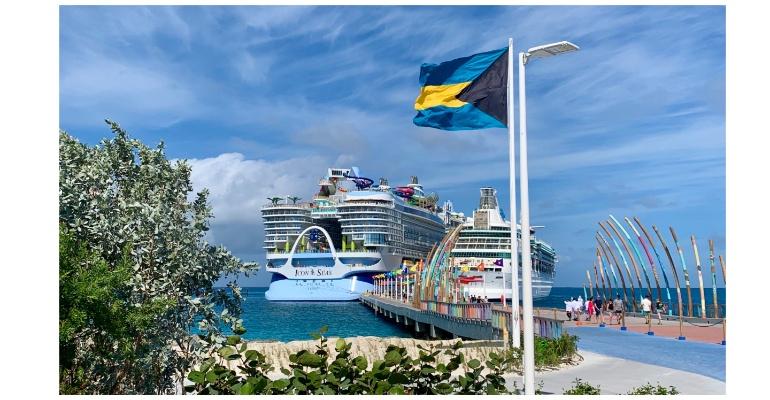Since the Value Added Tax Act, 2014, goods and services on cruise line private islands have been exempt from VAT under the lines' agreements with The Bahamas, a practice successive administrations have let stand.
March 1 implementation
Now cruise operators just learned the government intends to implement the VAT March 1.
According to what industry sources know so far, notice of this change was never presented by government to cruise lines but simply 'surfaced' in a document labeled 'Draft Version 5: January 15, 2024' that calls for written comments to be provided to the Department of Inland Revenue (DIR) by Feb. 16 — next week.
Since cruises are typically sold months in advance, cruise lines initially would have to eat this cost increase but ultimately cruise passengers would see the price of goods and services they buy on the private islands go up 10%. That is a hefty hike.
And it closely follows the cruise head tax increase that took effect in January.
Creating a level playing field with Bahamian providers
Finance Ministry Secretary Simon Wilson told The Tribune that changes currently set to take effect in four weeks are designed to place the cruise lines’ private island activities on a 'taxation level playing field' with Bahamian providers who service their guests at other destinations.
Wilson could not estimate how much revenue may be generated since government, he said, doesn't have access to the cruise lines' commercial records.
The guidance document states VAT liability applies to a supply of services comprising cultural, artistic or similar activities connected with tangible personal property that takes place at the location where the service is physically performed and a supply of goods that takes place where the goods are delivered or made available by the supplier.
'Therefore, where goods and services are provided or sold on-island the place of supply is considered to be in The Bahamas and the supply of these goods and services is subject to VAT at the standard rate,' the guidance reads. 'This is an important change in the DIR's position as it relates to the VAT treatment of supplies made on private islands and by cruise lines.'
Things that will attract VAT
Among the items that will attract VAT are food and beverages, recreational activities, equipment rental, spa services, cabana rental and shore excursions.
Update: Cruise lines do collect and pay VAT for 'on-island' sales so a main issue is with the pre-sale of shore excursions via their sales channels. Also, the imposition of taxes on food items that are generally provided as part of the cruise fare at private ports is seen as essentially a tax on the cruise ticket.
Destinations that would be impacted include Royal Caribbean's Perfect Day at CocoCay, Norwegian Cruise Line's Great Stirrup Cay, Disney Cruise Line's Castaway Cay and the new Lookout Cay at Lighthouse Point (set to open in 2025), Holland America Line's Half Moon Cay, MSC Cruises' Ocean Cay MSC Marine Reserve, Princess Cruises' Princess Cays and Carnival Cruise Line's new Celebration Key (2025).
Seatrade Cruise News reached out to cruise operators and to the Florida-Caribbean Cruise Association for their reactions. Lines seemed taken by surprise — 'shell-shocked,' to use one expression —over the imminent charge and weren't prepared to comment Tuesday.
The FCCA said: 'We are reviewing the matter and will get back to you.'
But several longtime industry executives who would only speak provided they weren't named conveyed their dismay over the lack of process, the timing and the precedent.
'Is this called partnership? Is The Bahamas trying to get the cruise industry to reduce calls?' one said.
'To spring this on short notice without any way to short-term mitigate this is not right,' another person said. 'Nobody questions government's ability to charge VAT,' he continued, 'but in discussions with investors, you make certain concessions and this exemption has always been in place for cruise lines that invested to build [private islands] dating back to when the VAT was introduced.'
Killing the goose that laid the golden egg?
The Bahamas are currently thriving with a record more than 9m visitors in 2023, consumer sentiment is strong and shore excursion sales are robust, however price hikes could kill the goose that laid the golden egg.
'It makes the product you're trying to sell less competitive with other destinations,' a source said. 'It's a consumer tax. If you're a tourist looking at a 10% cost increase, you may not make the purchase and this may trickle down to impact Bahamian jobs.
'If the cruise lines had the ability to float a 10% increase in the cost of tours without repercussions, they would,' he added, 'but there are limits.
'Sadly, it's giving the industry an excuse to reassess The Bahamas.'
Nassau impact?
Cruise lines with private islands are still going to send ships there — they've heavily invested and ratings are high; Royal Caribbean touts Perfect Day at CocoCay as its top-rated destination globally — but it's possible Nassau calls could be impacted going forward.
While Nassau Cruise Port vastly improved port infrastructure in recent years and passenger numbers have soared there, multiple sources said the destination hasn't increased offerings and attractions that raise Nassau's appeal to cruisers, guest satisfaction or tour sales.
'Outside of Baha Mar and Atlantis, there is nothing to do,' one person said. 'Most people have cruised to Nassau and cruise passengers don't want to get off the ship in Nassau.'
Business Research & Economic Advisors' 2018 economic impact study of destinations for the FCCA, the most recent report of its kind, tallied passengers' 'likelihood to return' to The Bahamas at 5.4 out of 10.
Copyright © 2024. All rights reserved. Seatrade, a trading name of Informa Markets (UK) Limited.
Add Seatrade Cruise News to your Google News feed.  |

